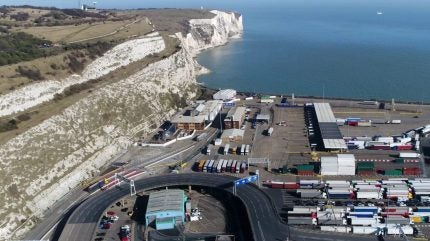
The UK government has responded to a report suggesting it is once again set to delay the introduction of import checks on fresh food coming from the EU by saying it is “reflecting on feedback”.
The Financial Times reported ministers are set to announce a further delay to the border controls over fears the extra bureaucracy for imported goods would further fuel inflation.

Discover B2B Marketing That Performs
Combine business intelligence and editorial excellence to reach engaged professionals across 36 leading media platforms.
Import checks need to be introduced as part of the UK’s Brexit arrangements following its departure from the EU at the start of 2021. But while goods from Britain already face EU checks and paperwork demands, the UK has repeatedly delayed introducing controls on EU food and plant goods.
In June, industry body the Fresh Produce Consortium (FPC) warned that import border checks on goods from the EU will only worsen food inflation in the country.
It rallied its members to sign letters to UK ministers protesting the draft strategy by the Department for Environment, Food and Rural Affairs (Defra), which would impose a charge for every consignment entering the country from continental Europe.
Those fears appear to be shaping current thinking in London. In a statement sent to Just Food, a government spokesperson said: “The government remains committed to delivering the best border in the world. The Border Target Operating Model is key to delivering this and introduces an innovative approach to importing that will be introduced progressively.

US Tariffs are shifting - will you react or anticipate?
Don’t let policy changes catch you off guard. Stay proactive with real-time data and expert analysis.
By GlobalData“We are reflecting on the valuable feedback provided by a range of businesses and industry stakeholders and will publish the Border Target Operating Model shortly.”
It is understood the government is hoping the model it is considering will decrease costs for businesses by around £520m ($658.5m) per annum compared to the original import model that would have been introduced in 2022. It has been suggested this would be achieved by reducing the complexity and volume of paperwork associated with importing.
The implementation of import rules has been delayed a number of times with the government previously citing the Covid-19 pandemic and the war in Ukraine as reasons for postponements.
But while the FPC has issued concerns about the inflationary impact of such controls while food prices in the UK are already high, other food producers have argued that while they are not in place it gives an advantage to continental rivals while they have to endure checks on all fresh food exports to the bloc.
Government insiders told the FT that further details of the rules applying to food imports would be published “very soon” but the introduction would be pushed back.
“The driving force behind this is the need to bear down on inflation, that’s why there will be a delay. There will be additional costs at the border,” the FT said, quoting its sources.
The government said in April it would require health certifications on some animal products, plants and food and feed goods coming from Europe by 31 October while further requirements, such as physical checks and safety declarations, were due to be introduced in stages through 2024.
But the UK’s The Guardian newspaper said it is expected the October checks will be pushed back to the end of January.





